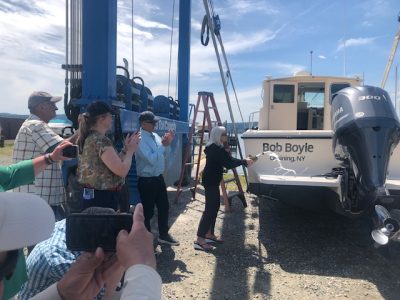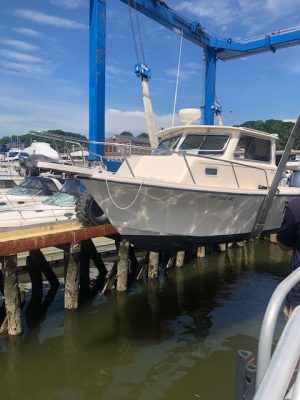Riverkeeper Launches New Water Quality Boat to Test the Hudson
News Based on facts, either observed and verified directly by the reporter, or reported and verified from knowledgeable sources.

By Michael Gold
Riverkeeper launched a new water quality monitoring boat last week that will collect and analyze river samples at 74 locations in the Hudson River and more than 100 locations in its tributaries.
The christening took place on June 2 at Ossining’s Westerly Marina.
The boat, named the Bob Boyle, honoring Riverkeeper’s founder, will be used to collect and check water samples from May through October each year between New York Harbor and Troy, to make sure the river is safe for swimming, fishing and drinking. It is Riverkeeper’s third boat.
In Westchester, the boat will collect river water in Ossining, Tarrytown, Irvington, Kingsland Point Park, Croton-on-Hudson, Peekskill and other sites. In Putnam County, the boat will take samples in Cold Spring, near the bottom of Main Street, and at Little Stony Point.
Of all the public parks on the river in Westchester and Putnam, swimming is currently allowed only at Croton Point Park.
The new NY SWIMS grant program could allow many more municipalities to open beaches or install river pools in the Hudson. River Pool at Beacon, a nonprofit group, offers a river pool, a circular pool with a netted bottom, for residents in the City of Beacon in Dutchess County. You can also swim in the Hudson in Ulster County, at Kingston Point Beach and the Sojourner Truth/Ulster Landing County Park in Saugerties.
Shannon Roback, Riverkeeper’s science director, said 100,000 people rely on the Hudson for their drinking water. Municipalities that draw drinking water from the river are Poughkeepsie, Rhinebeck, Hyde Park, Esopus and Lloyd and Dutchess and Ulster counties.
“As climate change advances, more people may rely on the Hudson for drinking water,” Roback explained.

The Bob Boyle onboard laboratory will check for “bacteria that can cause negative health effects,” Roback said. Scientists working on the boat will measure for fecal indicator bacteria, which is strongly associated with sewage and animal waste.
Torrential rains flood the river with a “big influx of pollution,” Roback said. Heavy rains mean there’s “an increased likelihood that sewage treatment plants will release untreated sewage into the river,” she pointed out.
Other pollutants from wastewater treatment plants include “everything going down the drain in your house,” Roback said, including soap, pharmaceuticals, cleaning detergents, disinfectants and chlorine treatment that are used to kill viruses and bacteria.
“The chlorine can react with other chemicals to make new chemicals,” Roback explained.
Two of these, THHM and HAA5, are carcinogens, she said. Once in the river, they become highly diluted.
Riverkeeper scientists will also measure the pH, salinity and temperature of the water, which affects aquatic wildlife.
Riverkeeper posts the data on its website, so “the public will be able to use the portal to learn about water quality,” Roback stated. “Is it safe to swim, fish and drink? Should you be concerned?”
“Riverkeeper is developing a new data portal that will be released in 2025 that will include more water quality data that will allow the public to better understand water quality in the Hudson River and its tributaries,” Roback wrote in a follow-up e-mail.
“The work of Riverkeeper really has made a difference, said Thomas Staudter, a spokesman for state Sen. Peter Harckham (D-Lewisboro), who spoke at the launching. “Without Riverkeeper, the river wouldn’t be as clean.”
Harckham secured a $100,000 state grant to help purchase the new boat.
“The river won’t heal itself,” John Lipscomb, Riverkeeper patrol boat captain and vice president for advocacy, told those attending the launch. “We want to heal it.”
Lipscomb said the two questions he’s heard the most from the public are how’s the water and am I going to get sick if I swim?
“The data keeps the heat on (municipalities),” he said.
“Science is one of the critical tools to help the river,” Lipscomb added. “Bob Boyle understood that.”
Steering the boat in the Hudson on its inaugural trip, Lipscomb said Riverkeeper discovered elevated levels of fecal indicator bacteria where the Pocantico River meets the Hudson from a test conducted in May.
“The tributaries have a higher concentration of fecal bacteria,” explained Dan Shapley, Riverkeeper’s senior director of advocacy, policy and planning.
“Sewage pipes are crisscrossing streams,” Shapley said. “There are leaks from pipes.”
The best water quality on the river can be found at Croton Point Beach, Irvington Beach, Ulster Landing Beach, the Nyack Launch Ramp and Ossining Beach, according to Riverkeeper’s website.
The worst water quality is at Tarrytown Marina, the Rondout/Kingston Public Dock, the Newburgh Launch Ramp, the Bethlehem Launch Ramp near Albany and the Albany Rowing Dock.
Also attending the launch event were Assemblywoman Dana Levenberg (D-Ossining) and Ossining Town Supervisor Liz Feldman, who both praised Riverkeeper’s work.
Boyle’s family, which includes his wife Katherine and his three adult children, traveled on the boat’s first ride in the water.
Boyle, who died in 2017, founded Riverkeeper’s predecessor organization, the Hudson River Fisherman’s Association, in 1966. He was also a writer for Sports Illustrated. He covered the New York Jets, boxing and the environment.
Boyle also wrote about toxic pollution of water sources and a book on global warming, with climate scientist Michael Oppenheimer, now at Princeton University, titled “Dead Heat: The Race Against the Greenhouse Effect,” in 1990.
To learn more about water quality in the Hudson and its tributaries, visit https://link.edgepilot.com/s/c3b73d57/Jk7Ii3etSUOlOiDX3pHPjQ?u=https://www.riverkeeper.org/water-quality/hudson-river.

Examiner Media – Keeping you informed with professionally-reported local news, features, and sports coverage.
